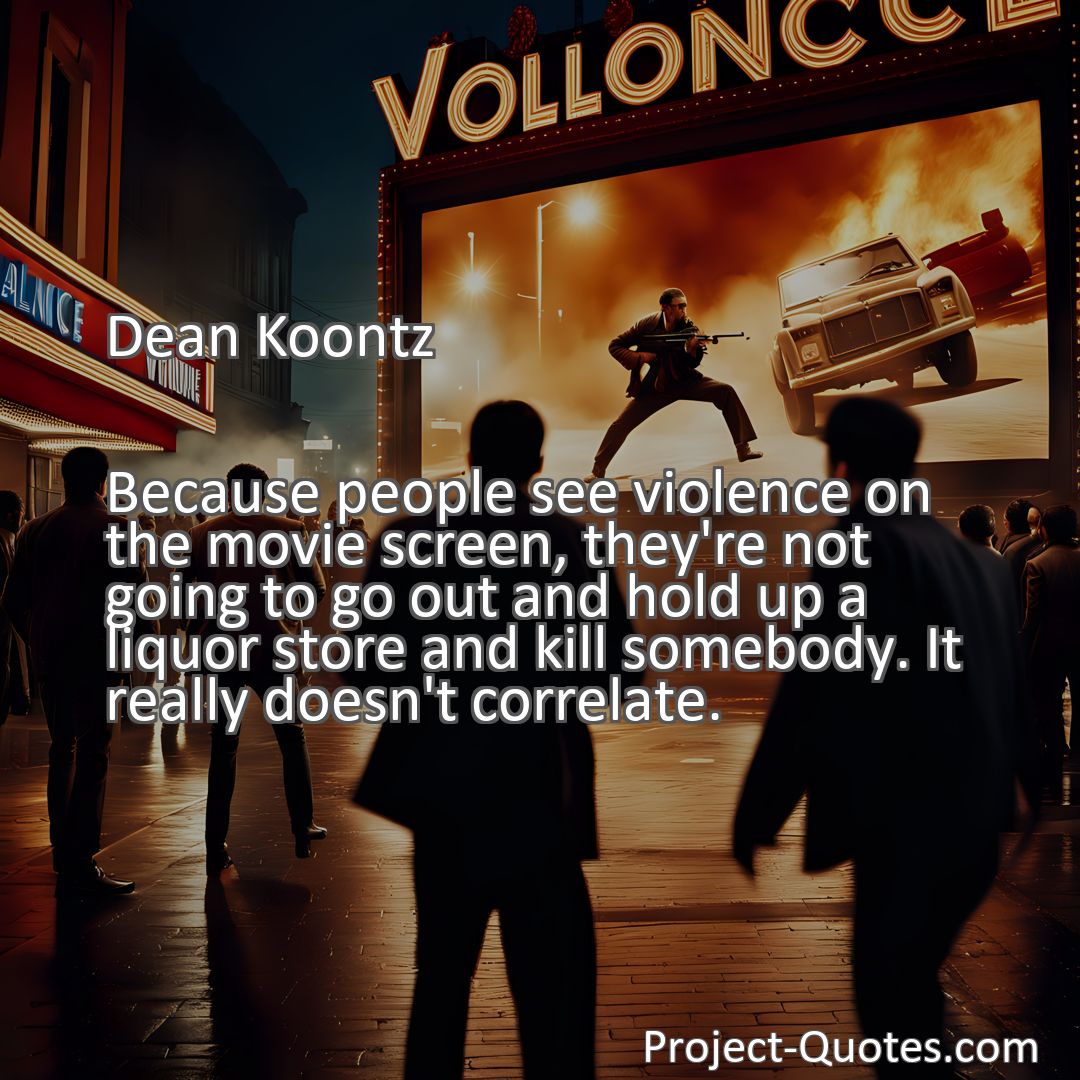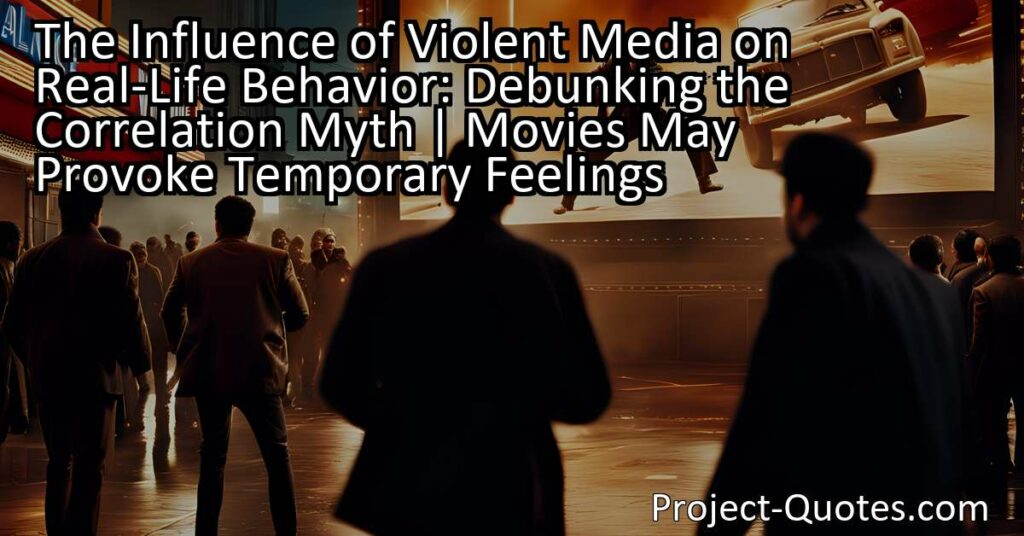Because people see violence on the movie screen, they’re not going to go out and hold up a liquor store and kill somebody. It really doesn’t correlate.
Dean Koontz
The Influence of Violent Media on Real-Life Behavior: Debunking the Correlation Myth | Movies May Provoke Temporary FeelingsContrary to popular belief, watching violent movies does not directly lead to real-life violent behavior. While short-term exposure to violent media may temporarily increase aggressive thoughts and feelings, the majority of people possess the ability to differentiate between fantasy and reality. Factors such as empathy, moral development, and societal influences play a more significant role in shaping behavior. It is crucial for parents to provide guidance, for society to implement regulations, and for individuals to develop critical thinking skills to promote responsible media consumption.
Table of Contents
- 1 Because people see violence on the movie screen, they’re not going to go out and hold up a liquor store and kill somebody. It really doesn’t correlate.
- 2 Dean Koontz
- 3 Meaning of Quote – Because people see violence on the movie screen, they’re not going to go out and hold up a liquor store and kill somebody. It really doesn’t correlate.
- 4 Freely Shareable Quote Image
- 5 Related
Meaning of Quote – Because people see violence on the movie screen, they’re not going to go out and hold up a liquor store and kill somebody. It really doesn’t correlate.
The Influence of Violent Media on Real-Life Behavior: Debunking the Correlation Myth
Introduction:
In today’s world, where technology plays a prominent role in our lives, concerns about the impact of violent media on individuals, particularly the youth, have become increasingly prevalent. This quote by renowned author Dean Koontz challenges the widely held belief that exposure to violence in movies leads directly to real-life violent behavior. In this article, we will delve into the complexities of this issue, examining empirical research, psychological theories, and societal factors that demonstrate the questionable correlation between violent media and criminal behavior.
Understanding the Quote:
Dean Koontz makes a compelling argument against the common assumption that watching violence on the big screen directly incites individuals to commit violent crimes. To begin, it is crucial to highlight that millions of people watch violent movies, yet the overwhelming majority do not engage in criminal activities. Therefore, it is evident that the mere presence of violence in media does not inherently fuel real-life violence.
Empirical Perspectives:
Extensive research has been conducted to investigate the relationship between violent media and aggressive behavior. Studies consistently find that short-term exposure to violent media does lead to increased aggressive thoughts and feelings. However, it is crucial to distinguish between aggression and violent behavior. Aggression refers to hostile thoughts and intentions, while violent behavior refers to actions that cause physical harm to others. The majority of individuals can differentiate between fantasy and reality, understanding that what they witness on screen remains within the realm of make-believe.
Psychological Explanations:
Cognitive psychologists argue that individuals possess an innate ability called “reality testing.” This capacity allows us to discern between fictional representations and real-life situations. While violence in movies may provoke temporary feelings of anger or excitement, most individuals possess the cognitive skills necessary to differentiate reality from fantasy. Additionally, factors like empathy, moral development, and social norms significantly impact an individual’s moral compass, preventing them from embracing violent behavior.
Societal Influence:
While violent media has become widely accessible in recent years, levels of crime and violence have seen a steady decline. Numerous societal factors contribute to this phenomenon, such as increased law enforcement efforts, educational campaigns, and improved living conditions. It is crucial not to overlook the significant role these external influences play in shaping an individual’s behavior and choices. Blaming violent media alone for societal issues fails to acknowledge the complex interplay of various factors at work.
Parental Responsibility:
Parents are integral in shaping their child’s media consumption habits and attitudes towards violence. Numerous studies highlight the importance of parental guidance in mitigating any potential negative impacts of violent media. Engaging in meaningful conversations, setting viewing restrictions, and promoting critical thinking skills can empower children to develop the ability to discern fiction from reality. By fostering an open and supportive environment, parents can help their children make informed choices about media consumption.
Media Regulation and Classification Systems:
Many countries have stringent regulations and classification systems in place to safeguard young audiences from inappropriate content. By integrating age restrictions and content warnings, these systems play a critical role in guiding parents and individuals about the suitability of media for different age groups. Society must continue to support and improve such frameworks to ensure that people can make informed decisions when selecting media content.
Alternative Perspectives:
Contrary to the belief that violent media solely promotes aggression and desensitization, alternative theories suggest that it may serve as a cathartic release for individuals. By vicariously experiencing aggression through fictional characters, viewers can release their pent-up frustration and anger in a controlled setting, providing a safe outlet for emotional catharsis. This perspective advocates for the notion that allowing individuals to engage with fictional violence can potentially reduce real-life aggression.
Conclusion:
Dean Koontz’s quote challenges the widely held belief that violent media is directly responsible for fueling real-life violence. By delving into empirical research, psychological theories, societal factors, and alternative perspectives, it becomes evident that the correlation between violent media and criminal behavior is complex and multi-faceted. While short-term exposure to violent media may lead to an increase in aggressive thoughts, it is critical to recognize the vast array of external factors that play a more significant role in shaping individual behavior.
It is essential to approach this topic with nuance and understanding, acknowledging that media alone cannot shoulder the blame for societal issues. By focusing on comprehensive solutions such as increased parental involvement, media regulation, and fostering a positive social environment, we can work towards mitigating any potential negative effects and promoting responsible media consumption.
In conclusion, it is crucial to educate ourselves and develop critical thinking skills to discern between fiction and reality. By doing so, we can better understand the true impact of violent media and contribute to a society that encourages empathy, understanding, and responsible media consumption.
I hope this quote inspired image brings you hope and peace. Share it with someone who needs it today!


